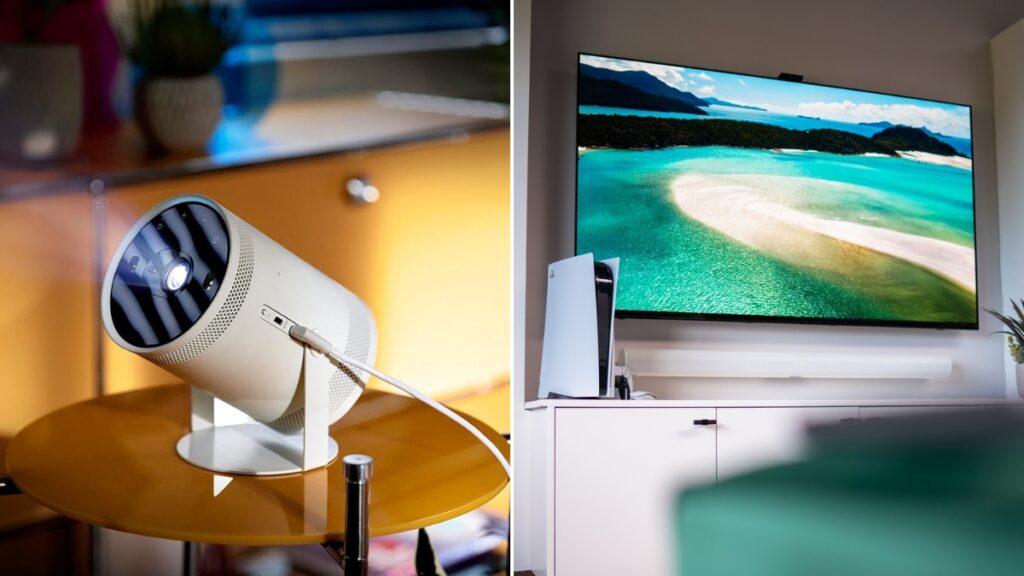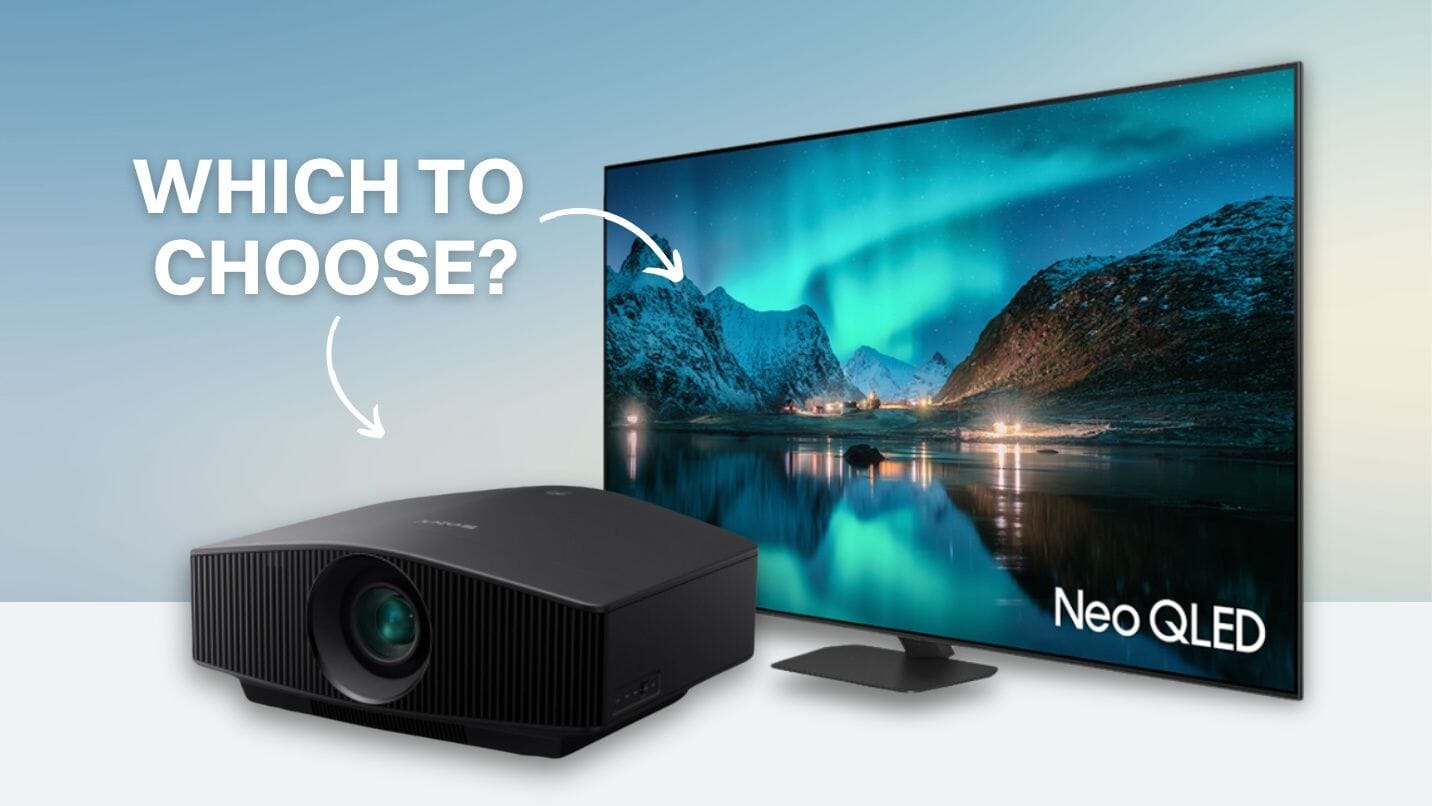Projector vs TV: 7 Key Things You NEED To Consider
Designing your dream home cinema setup? One big question stands in the way: should you go for a projector or a TV? Each has its unique advantages and drawbacks, and the right choice depends on your space, viewing habits, and budget. In this guide, we’ll break down the pros and cons of each to help you decide which display will give you the ultimate cinematic experience.
Projector vs TV: Strengths & Weaknesses
When you’re deciding between a home cinema projector and a TV, there are several factors to consider, including screen size, image quality, setup complexity, and cost. Let's break them down:
1. Screen Size
Projector: If you're looking for a truly cinematic experience, a projector typically offers bigger screen sizes, far surpassing even the largest TVs. This makes projectors ideal for large rooms and dedicated home cinemas. For example, the Sony VPL-XW5000E is a fantastic 4K projector that delivers stunning visuals and an impressive max screen size of up to 200 inches.
TV: While TVs are getting bigger, most TVs max out at around 85 inches, with a few high-end models like the Samsung QN90D reaching 98 inches. Naturally, the bigger the screen, the more expensive the TV. So, If you're after a truly massive display, a projector is likely the more cost-effective option.
✅ Projector: Ideal for 100"+ screens, delivering a true cinema feel.
✅ TV: smaller screen size but offers better brightness & clarity.
2. Picture Quality & Brightness
Projector: While modern projectors have made significant advancements in resolution (4K and even 8K models), they generally require a dark room to produce the best image quality. Ambient light can wash out the display, reducing contrast which ultimately makes these unsuitable for brighter spaces.
TV: Generally speaking, TVs offer superior brightness, deeper blacks, and more vibrant colours, making them better suited for rooms with natural light. if you're dealing with a very well-lit space, mini-LED TVs like the Sony Bravia 9 are particularly impressive.
✅ Projector: Needs a dark room for best results.
✅ TV: Better pick for well-lit rooms.
3. Contrast & Black Levels
Projector: Most projectors struggle with deep blacks due to light reflection, which can result in a less immersive experience in bright rooms. However, high-end laser projectors, like the Sony VPL-XW7000ES, incorporate advanced contrast enhancement technology to produce deeper blacks and more vibrant colours, getting closer to OLED levels.
TV: When it comes to TV technology, OLED displays set the benchmark for contrast and black levels. Unlike traditional LED or QLED TVs, which rely on a backlight to illuminate the screen, OLED panels use self-emissive pixels. This means each pixel can turn on and off independently, allowing OLED TVs to achieve absolute blacks by completely switching off individual pixels.
✅ TV: OLED TVs in particular offer true blacks and infinite contrast.
❌ Projector: Most struggle with deep blacks, though high-end laser projectors are improving.
4. Space & Setup
Projector: Requires additional setup, including a screen or a blank wall, correct mounting, and adequate throw distance.
TV: A TV is a plug-and-play solution that requires minimal setup and often a better choice for smaller rooms.
✅ TV: Plug-and-play, easy setup, wall-mountable.
❌ Projector: Needs a screen/wall, potential mounting, and throw distance.
5. Lifespan & Maintenance
Projector: Bulbs and laser light sources have limited lifespans, with traditional lamps lasting around 2,000-5,000 hours and laser projectors extending up to 30,000 hours.
TV: Modern LED and OLED TVs typically last 50,000+ hours with minimal maintenance.
✅ TV: Lasts longer with minimal upkeep—just set it up and go!
❌ Projector: Bulbs need replacing (2,000–5,000 hrs), while laser models last longer (up to 30,000 hrs)
6. Gaming Performance
Projector: Some high-end gaming projectors offer low input lag, but many still struggle with response time and refresh rates.
TV: With varying support for features like HDMI 2.1, 120Hz refresh rates, VRR and ALLM, modern TVs are the preferred choice for gaming. The LG C4 OLED is a top choice among gamers.
✅ TV: Most high-end TVs support advanced gaming features like 4K 120Hz, VRR, ALLM, & HDMI 2.1
❌ Projector: Most lack fast refresh rates and have higher input lag.
7. Cost Considerations
Projector: While some entry-level projectors can be a budget-friendly way to achieve a large screen size, investing in a high-quality 4K laser projector can be a significant outlay. For those looking for the best of the best performance you may also need to consider the cost of a dedicated screen or an external audio system.
TV: Sure, premium big-screen TVs come with a hefty price tag, but they’re usually a one-and-done investment. You’re not just paying for size—you’re getting top-notch technology, built-in speakers that can be improved on later down the line, and smart features that make streaming easy. When you factor in all the benefits, the upfront cost makes better sense, especially if you want a fuss-free, high-performance home theatre setup.
✅ Projector: Broadly speaking, cheaper for large screens, but premium options are pricey.
✅ TV: Higher upfront cost, but an all-in-one package (display, sound, smart features)
Best Use Cases: Which One Should You Choose?

Not sure which one to go for? Don’t worry—this table isn’t a hard rule, just a general guide! Your space, setup, and personal preferences will play a big role in what works best for you.
| Use Case | Best Choice |
| Dedicated Home Cinema Room | Projector |
| Bright living room setup | TV |
| Gaming | TV |
| Outdoor movie night | Projector |
| Smaller space | TV |
Our Verdict: Which Display Is Best For Your Home Cinema?
So, the big question: projector or TV? Honestly, there's no one-size-fits-all answer – it really boils down to your priorities.
For that true cinematic experience, the kind that makes you feel like you're at the movies, a projector is hard to beat. But, and this is a big but, it's not just about throwing an image on the wall. For the best experience, you’ll need a dedicated space, a good screen (that makes a huge difference), and a sound system that can handle the scale. Plus, setting up a projector can take some time and effort, so make sure you're prepared for that too.
TVs, on the other hand, are all about convenience and top-level picture quality to match. If you want a big screen experience without the hassle, a TV is definitely the way to go. They're super easy to set up, offer top-notch picture quality, and work great in the majority of lighting conditions. The only issue is, if you're looking to replicate that big screen experience, it may cost considerably more.
For most users, a high-performing TV is the best all-around option for home entertainment, gaming, and everyday use. But if you dream of a true cinema feel, investing in a premium home cinema projector will be well worth it.
Other Useful Content
Blog: LG G4 vs Samsung S95D: Which OLED TV is Right For You?
Video: The ULTIMATE setup? 120" AWOL Vision LTV-3000 Pro Laser Projector Review
Video: TV Panel Type Buying Guide: OLED vs QLED vs QNED vs Micro LED vs Mini LED & More
For more information about TVs, Projectors or any other home cinema products, get in touch and one of our Tech Guides would be happy to help!
| info@smarthomesounds.co.uk | |
| Live Chat on our Website | |
| 0800 677 1100 |
Why buy from Smart Home Sounds? We offer Lowest Price Guarantee, Free Next Day Delivery* and 0% Finance Available. Looking for more personal advice? Contact our team of experts today. Shop TV



